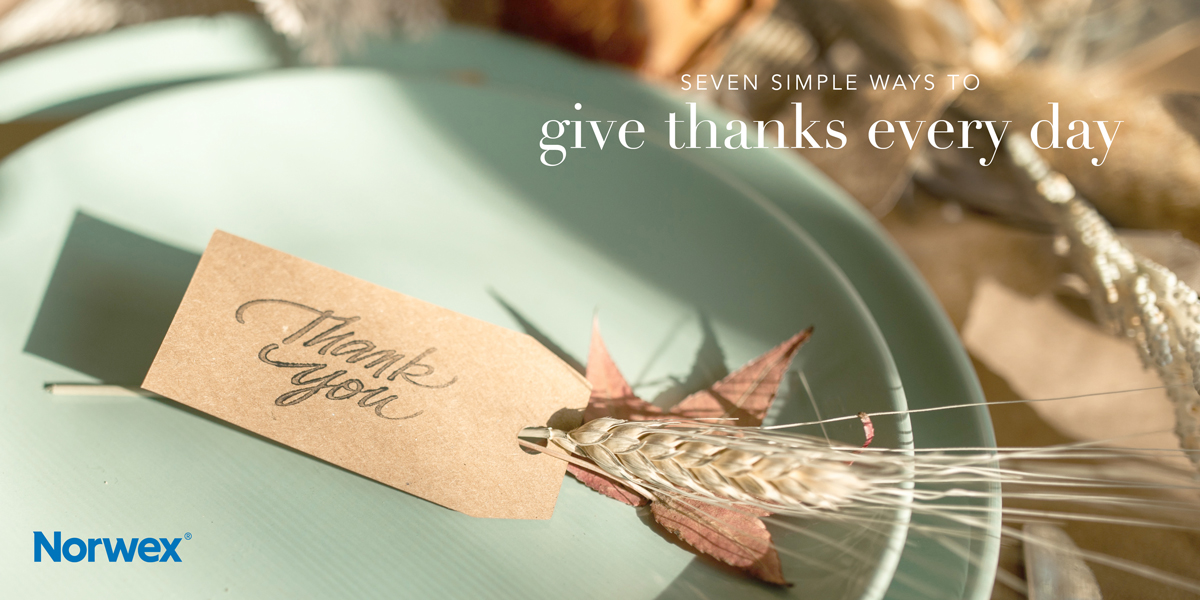
Grocery shopping, cooking, prepping our homes for guests . . . it’s all part of the pre-Thanksgiving hustle and bustle. But just as important is remembering the true meaning of the holiday—giving thanks for the things we cherish most. Practicing gratitude has widespread benefits, from improving our health to boosting our relationships with others. In the simplest terms, being grateful makes us happier—physically, spiritually and emotionally.
In many ways, gratitude goes beyond just feeling thankful; it’s actually a state of being, a sense of appreciation that comes from within. No matter when we celebrate Thanksgiving—in Canada last month, in the U.S. next week—we want to build on that feeling by making gratitude an integral part of our lives 365 days a year.
The key? Becoming more aware so that we recognize even the smallest things we’re thankful for. And then, it’s about living out that gratitude every day. Taking a cue from our Norwegian heritage—and Norway’s simpler and environmentally thoughtful way of living—we can start by slowing down, awakening our senses and optimizing every moment we spend with our nearest and dearest.
Like any skill, gratitude can be learned and strengthened. Here are seven ways to add gratitude to your daily life.
- Start by observing. Think about all the times you say “thank you” in a day. Often, it’s an afterthought. The next time, stop and take notice of what you’re thanking that person for. According to neuroscientists, if you really feel it when you say it, you’ll be happier and healthier.
- Appreciate everything. Don’t leave anything out, from the weather on a beautiful day to catching up with a friend. Even the smallest niceties are worthy of attention.And appreciation not only relates to positive experiences. Sometimes reflecting on hard times reinforces just how far we’ve come. Digging a little deeper allows you to be grateful for how everything in life impacts the person you are today.
- Be mindful. Focusing on what you’re grateful for can actually rewire your brain to be more positive and optimistic.Many people find success keeping a gratitude journal. Putting pen to paper forces you to consciously think about the words you’re writing (no distracting or ungrateful thoughts allowed). And while one study showed journaling is most effective at night—it gives you an outlet for emotions and thoughts that might otherwise keep you awake—it’s all about consistency. Find a time that works for you, then stick to it.
Some additional tips for keeping a gratitude journal include:
- Be as specific as possible. General thoughts—“I’m grateful for my friends”—is less effective than being thankful for the actual thought or action.
- Go for depth over breadth. Details carry far more weight than a more general assessment.
- Get personal. In short, be thankful for people more than things.
- Don’t underestimate the element of surprise. When you don’t expect something, you tend to feel stronger levels of gratitude.
- Revise if you repeat. If you find yourself writing about the same things, try to elaborate on a different angle.
- Write at the same time every day. What counts most is making it a habit.
The end goal? Focus on a positive event, experience, person or thing in your life—then enjoy the emotions that come with it.
- Try meditating. It can widen your perspective and increase self-awareness over time. Guided meditation also promotes acceptance, positive detachment, forgiveness and, thus, gratitude. Imagine a specific situation you’re grateful for and allow those feelings to grow.
- Give back. It’s a simple concept: Helping others helps you. Research shows volunteering is a very reliable way to momentarily increase your feelings of well-being. In addition, it can help reduce stress, increase confidence, prevent feelings of isolation and provide a sense of purpose and meaning.
- Come to your senses—literally. Through our ability to touch, see, smell, taste and hear, we gain a greater, more enhanced, appreciation of everything life has to offer.
- Spend time with loved ones. Along with strengthening your relationships, it will give you a chance to practice gratitude on people that you care about. It’s also important to share positive feelings with others. Expressing your gratitude for someone not only makes their day—it can do wonders for increasing your own happiness. Need proof? Look no further than the way it makes you feel to be on the receiving end.
Finally, like millions of Norwex® fans around the world, consider sharing our proven, effective, sustainably minded products with family and friends. You’ll not only be helping to make their homes safer, but the planet as well. And that’s something we can all be grateful for.
“I’m grateful for spending time with my family every day and for the love they share with me.”
Amy Cadora, Norwex Chief Brand and Mission Officer
 While sometimes we may feel more grateful than at other times, if we choose to focus on things to be grateful for, they’re usually there to be found. Please take a moment to share what you’re grateful for in the comments below.
While sometimes we may feel more grateful than at other times, if we choose to focus on things to be grateful for, they’re usually there to be found. Please take a moment to share what you’re grateful for in the comments below.Resources:



I’m grateful for the time I have with my teenager this week.
I’m so thankful for my Lord and Savior Jesus Christ and that His Spirit lives in my heart! His influence in my life has changed my heart and attitude over time. Knowing I’m loved and accepted by Him has changed me from worrying about what people think of me and whether they like me. This helps me forget about myself and be a better friend, wife and sister. Everyone needs to feel loved and accepted!
I am thankful my hubby’s walking pneumonia is ending, that it didn’t go into full blown pneumonia or a hospital stay.
I thank the Great Spirit every night for the many people and things that make my life so wonderful. As I lay my head on my pillow I think back over the day and acknowledge how lucky I am not just to have these things to be thankful for but that I am wise enough to be cognizant. It’s a wonderful way to fall asleep!
I’m grateful for family and friends. For happy memories and new memories. I’m grateful for mental health and hope and pray the ones struggling with theirs reach out and get trusted medical help.
My job which allows me to be present with my kids doing the daily routines.